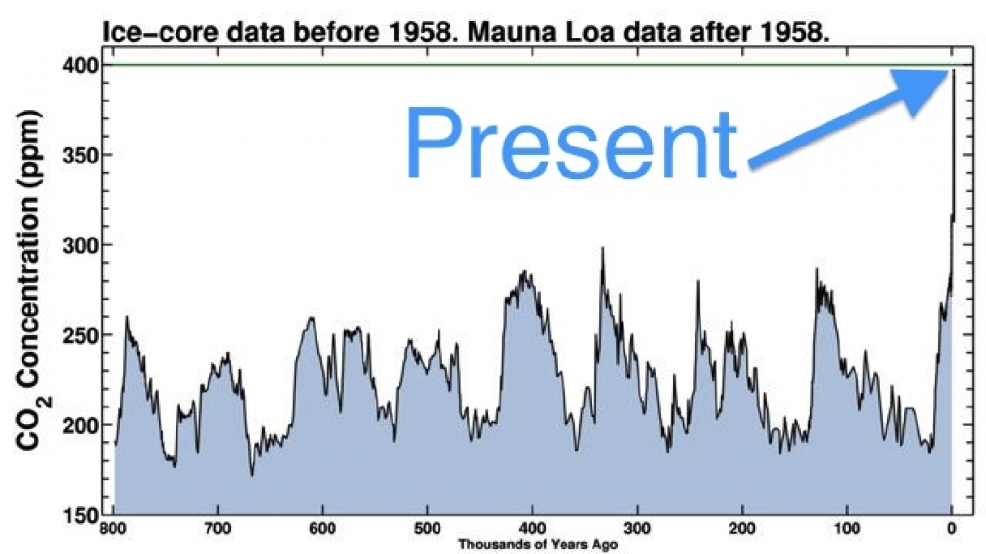30 December, 2016
2016: Historic Year for Climate (?)
Jeffrey Berardelli, the writer below, says he has a degree and career expertise in Atmospheric Sciences. He heads his post with the graph below, which is correct in saying that CO2 levels have increased greatly in recent years

But that is actually an embarrassment. He knows perfectly well that the effect of that rise is supposed to be a leap in global temperature. If there is no such accompanying leap, the entire Warming theory is wrong. But there has been no such leap. Now that the effect of El Nino has faded, temperatures have dropped back to the plateau that they have been on for the whole of this century. See my favourite graph below:

He circumvents that awkward truth by saying that the earth probably had its warmest year this year. It probably did. But that is an excellent example of lying with statistics: Using an inappropriate statistic. As my favourite graph shows, all the high temperatures were in the first half of the year. So if you average the temperatures of all the the months of the year, you get an elevated average mainly because of those early high temperatures. But is an average meaningful in those circumstances? Not if it disguises a trend, which it does. An average would be meaningful if there were highs and lows randomly throughout the year -- but that was not the case. The average does not reflect where the temperature was going and where it ended up. In failing to acknowledge that, Berardelli is simply being dishonest.
Furthermore Berardelli is imprecise in what he says about CO2 levels. They did NOT rise during the Warming event. I monitored the CO2 figures from both Cape Grim and Mauna Loa right from the onset of the warming -- beginning roughly in August 2015. And I noted that the 400ppm peak had been reached BEFORE that warming event and then plateaued during the warming event. There was no rise in CO2 levels accompanying the rise in temperature. So the temperature rise COULD NOT have been caused by a CO2 rise -- because there was no CO2 rise. And it's now in the journals that CO2 levels plateaued in 2015 and 2016. So El Nino did not merely contribute "part" of the 2015/2016 warming event, it contributed the WHOLE of it. So if we remove the influence of El Nino, we can see that there has been NO anthropogenic global warming for the whole of this century. The present high levels of CO2 have done nothing. Warmist theory is wrong
Why is Carbon Dioxide such an important part of our climate system? First I should mention that C02 makes up less than 1% of the atmosphere. But as you may have read CO2 is a Greenhouse Gas. That means it is very effective at absorbing energy in the infrared spectrum (ie. heat). Basically the sun heats the Earth. The Earth releases that heat and it is then absorbed by greenhouse gases like C02 and methane. So the more greenhouse gases you have, the more heat that is absorbed. It's really quite simple.
So why are we so alarmed? From ice core data we know that C02 has never been over 300 parts per million in the last 800 thousand years. Before the industrial revolution (in the 1800s) C02 concentration was at 270 parts per million. But in the last 150 years, with the increasing population and increased burning of fossil fuels for energy, that number has leaped to an unprecedented 400 parts per million.
To repeat what was just stated: in 800 thousand years of records we have never had C02 concentrations above 300 ppm, but now we have leaped to 400 ppm. Clearly humans have changed the chemical composition of the atmosphere. We have changed the balance that has existed for 800,000+ years. That's how an exponentially expanding population of tiny people can overwhelm a relatively large Earth.
Regardless of feelings, this jump in greenhouse gases, most notably CO2, is now driving the Earth's temperatures to record levels year after year. Although not completely done yet, 2016 is on pace to be the warmest ever. Part of that is due to El Nino. But it should be noted that El Nino ended in the Spring of 2016 yet record Global heat was observed well through summer. Since 1880, all of the top 15 warmest years globally, except 1998(an El Nino year), have occurred since the year 2000. We could go on and on about the record setting heat.
SOURCE
Go to John Ray's Main academic menu
Go to Menu of longer writings
Go to John Ray's basic home page
Go to John Ray's pictorial Home Page
Go to Selected pictures from John Ray's blogs